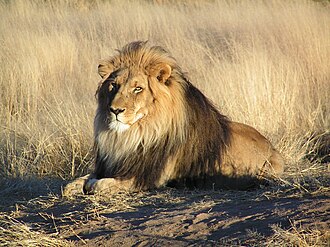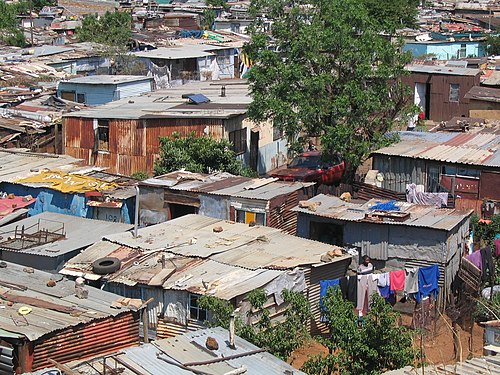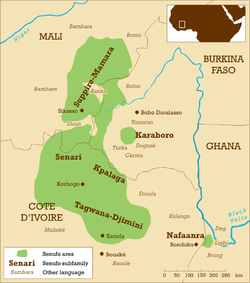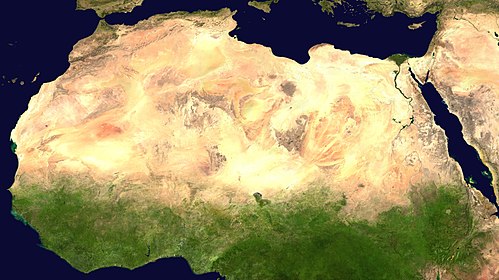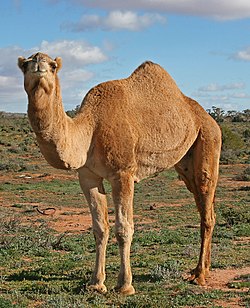Portal:Africa



Africa is the world's second-largest and second-most populous continent after Asia. At about 30.3 million km2 (11.7 million square miles) including adjacent islands, it covers 20% of Earth's land area and 6% of its total surface area. With nearly 1.4 billion people as of 2021, it accounts for about 18% of the world's human population. Africa's population is the youngest among all the continents; the median age in 2012 was 19.7, when the worldwide median age was 30.4. Based on 2024 projections, Africa's population will exceed 3.8 billion people by 2100. Africa is the least wealthy inhabited continent per capita and second-least wealthy by total wealth, ahead of Oceania. Scholars have attributed this to different factors including geography, climate, corruption, colonialism, the Cold War, and neocolonialism. Despite this low concentration of wealth, recent economic expansion and a large and young population make Africa an important economic market in the broader global context, and Africa has a large quantity of natural resources.
Africa is highly biodiverse; it is the continent with the largest number of megafauna species, as it was least affected by the extinction of the Pleistocene megafauna. However, Africa is also heavily affected by a wide range of environmental issues, including desertification, deforestation, water scarcity, and pollution. These entrenched environmental concerns are expected to worsen as climate change impacts Africa. The UN Intergovernmental Panel on Climate Change has identified Africa as the continent most vulnerable to climate change.
The history of Africa is long, complex, and varied, and has often been under-appreciated by the global historical community. In African societies the oral word is revered, and they have generally recorded their history via oral tradition, which has led anthropologists to term them "oral civilisations", contrasted with "literate civilisations" which pride the written word. African culture is rich and diverse both within and between the continent's regions, encompassing art, cuisine, music and dance, religion, and dress.
Africa, particularly Eastern Africa, is widely accepted to be the place of origin of humans and the Hominidae clade, also known as the great apes. The earliest hominids and their ancestors have been dated to around 7 million years ago, and Homo sapiens (modern human) are believed to have originated in Africa 350,000 to 260,000 years ago. In the 4th and 3rd millennia BCE Ancient Egypt, Kerma, Punt, and the Tichitt Tradition emerged in North, East and West Africa, while from 3000 BCE to 500 CE the Bantu expansion swept from modern-day Cameroon through Central, East, and Southern Africa, displacing or absorbing groups such as the Khoisan and Pygmies. Some African empires include Wagadu, Mali, Songhai, Sokoto, Ife, Benin, Asante, the Fatimids, Almoravids, Almohads, Ayyubids, Mamluks, Kongo, Mwene Muji, Luba, Lunda, Kitara, Aksum, Ethiopia, Adal, Ajuran, Kilwa, Sakalava, Imerina, Maravi, Mutapa, Rozvi, Mthwakazi, and Zulu. Despite the predominance of states, many societies were heterarchical and stateless. Slave trades created various diasporas, especially in the Americas. From the late 19th century to early 20th century, driven by the Second Industrial Revolution, most of Africa was rapidly conquered and colonised by European nations, save for Ethiopia and Liberia. European rule had significant impacts on Africa's societies, and colonies were maintained for the purpose of economic exploitation and extraction of natural resources. Most present states emerged from a process of decolonisation following World War II, and established the Organisation of African Unity in 1963, the predecessor to the African Union. The nascent countries decided to keep their colonial borders, with traditional power structures used in governance to varying degrees. (Full article...)
Selected article –
African admixture in Europe refers to the presence of genetic admixture from African populations within present-day and historical European populations.
More recent African admixture – primarily Berber admixture from North Africa – is associated with historic migrations through the Mediterranean Sea and the Muslim conquests of the Early Middle Ages. This admixture can be found primarily in the Iberian Peninsula (modern day Spain and Portugal), with higher levels in the West and the South and Southern Italy, with higher levels in Sardinia and Sicily. (Full article...)
Featured pictures –
Did you know (auto-generated) -

- ... that opera singer Charles Holland spent much of his career in Europe as opportunities in classical music for African Americans were limited?
- ... that Erick Russell is the first openly gay African American elected to a statewide office in the United States?
- ... that in 1890 Cornelius N. Dorsette, often referred to as the first African-American physician in Alabama, founded Hale Infirmary, a hospital for Black patients and staff in Montgomery?
- ... that South African president Jacob Zuma requested a tour of a Sainsbury's supermarket during his state visit to the United Kingdom in 2010?
- ... that Roland Jefferson, the first African-American botanist to work at the U.S. National Arboretum, helped preserve the famous flowering cherry trees in Washington, D.C.?
- ... that after erecting the African Union headquarters, the Chinese government was accused in 2018 of spying on the building for five years?
Categories
Selected biography –

Ahmed Hossam Hussein Abdel Hamid Wasfi (Arabic: أَحْمَد حُسَام حُسَيْن عَبْد الْحَمِيد وَصْفِيّ; born 23 February 1983), publicly known as Mido (Arabic: ميدو), is an Egyptian football manager and former player who played as a striker.
Mido started his career with Zamalek in Egypt in 1999. He left the club for Gent of Belgium in 2000, where he won the Belgian Ebony Shoe. This led to a move to Dutch side Ajax in 2001, from where he joined Celta Vigo on loan in 2003. His next destination was Marseille in France and he left them for Italian side Roma in 2004. He joined English side Tottenham Hotspur on an 18-month loan in 2005 and eventually joined the club permanently in 2006. He left the club in 2007 to join Middlesbrough, from whom he joined Wigan Athletic, Zamalek, West Ham United and Ajax on loan. In 2011, he rejoined Zamalek, before joining Barnsley in 2012. He also played for Egypt 51 times, scoring 19 goals. Mido retired from football in June 2013. (Full article...)
Selected country –
 |
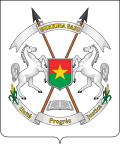 |
||

| |||
Burkina Faso, also Burkina, is a landlocked nation in West Africa. It is divided into thirteen regions, forty-five provinces, and 301 departments. It is surrounded by six countries: Mali to the north, Niger to the east, Benin to the south east, Togo and Ghana to the south, and Côte d'Ivoire to the south west. Its inhabitants are known as Burkinabé (pronounced [burkiːnaˈɓeː]).
Formerly called the Republic of Upper Volta, it was renamed on August 4, 1984 by President Thomas Sankara to mean "the land of upright people" in Moré and Dioula, the major native languages of the country. Literally, "Burkina" may be translated as "men of integrity", from the Moré language, and "Faso" means "father's house" in Dioula. Independence from France came in 1960. Governmental instability during the 1970s and 1980s was followed by multiparty elections in the early 1990s. Several hundred thousand farm workers migrate south every year to Côte d'Ivoire and Ghana in search of paid labour. (Read more...)
Selected city –
Kampala (UK: /kæmˈpɑːlə/, US: /kɑːmˈ-/ ⓘ) is the capital and largest city of Uganda. The city proper has a population of 1,875,834 (2024) and is divided into the five political divisions of Kampala, Kawempe, Makindye, Nakawa, and Rubaga.
Kampala's metropolitan area consists of the city proper and the neighboring Wakiso District, Mukono District, Mpigi District, Buikwe District and Luweero District. It has a rapidly growing population that is estimated at 6,709,900 people in 2019 by the Uganda Bureau of Statistics in an area of 8,451.9 km2 (3,263.3 square miles). Other estimates estimate put the size of the metropolitan area at around four million people. (Full article...)
In the news
- 24 April 2025 – Somali Civil War
- Al-Shabaab militants seize the town of Wargaadhi and its military base in Middle Shabelle, Somalia. More than 40 militants and twelve clan fighters are killed in related combat. (Al Jazeera)
- 24 April 2025 – Islamist insurgency in the Sahel
- The Beninese government announces that 54 soldiers were killed in an attack by Jama'at Nasr al-Islam wal Muslimin (JNIM) in the north of the country last week, after previously announcing only eight soldiers were killed. JNIM claims 70 soldiers were killed in the attack. (BBC)
- 22 April 2025 –
- Interpol rescues 33 West Africans, including people from Benin, Togo, Burkina Faso, and Ghana, from human trafficking rings in the Ivory Coast. (AP)
- 21 April 2025 – Spillover of the Sudanese civil war
- 2025 Nasir clashes
- The South Sudan People's Defence Forces capture the town of Nasir in Upper Nile State from the Nuer White Army. (Reuters)
- 21 April 2025 – Boko Haram insurgency
- The Islamic State claims responsibility for a series of deadly attacks targeting Christians and security forces in Borno and Adamawa, Nigeria earlier this month that killed at least nine people and injured several others. (Reuters)
Updated: 23:05, 24 April 2025
General images -
Africa topics
More did you know –
- ... that at approximately 5,000 years old, the Lothagam North Pillar Site is thought to be the earliest and largest monumental cemetery in eastern Africa?
- ... that a 2020 study found that African countries which allowed foreign funding of NGOs had a higher voter turnout?
- ... that Essop Moosa, who was of Indian origin, became the first non-white player to play for an all-white soccer team in South Africa, appearing under a pseudonym?
- ... that the Seventh German Inner Africa Research Expedition served as cover for a secret First World War espionage mission?
Related portals
Major Religions in Africa
North Africa
West Africa
Central Africa
East Africa
Southern Africa
Associated Wikimedia
The following Wikimedia Foundation sister projects provide more on this subject:
-
Commons
Free media repository -
Wikibooks
Free textbooks and manuals -
Wikidata
Free knowledge base -
Wikinews
Free-content news -
Wikiquote
Collection of quotations -
Wikisource
Free-content library -
Wikispecies
Directory of species -
Wikiversity
Free learning tools -
Wikivoyage
Free travel guide -
Wiktionary
Dictionary and thesaurus




